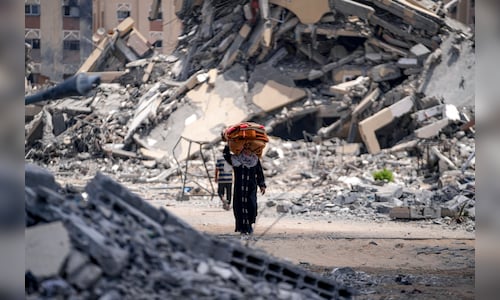The early morning attack set off air raid sirens, including at Israel’s international airport, where local media reported images of people running for shelters. There were no reports of casualties or damage, and the airport authority said operations resumed normally shortly afterward.
A fire could be seen burning in a rural area in central Israel and local media showed footage of what appeared to be a fragment of a missile or interceptor landing on an escalator at a train station in the central Israeli town of Modiin. The military said the sound of explosions in the area came from interceptors.
Yemen’s Iran-backed Houthi rebels have repeatedly fired drones and missiles toward Israel since the start of the Gaza war between Israel and the Palestinian militant group Hamas, but nearly all of them have been intercepted over the Red Sea.
The Houthis have not directly claimed responsibility for Sunday’s attack, but rebel officials appeared to boast about it.
Hashim Sharaf al-Din, a spokesman for the Houthi-led government, said Yemenis will celebrate the birthday of the Prophet Muhammad, while “Israelis will have to stay in shelters.” Another senior Houthi official, Hezam al-Assad, posted a mocking message in Hebrew on the social media platform X.
In July, an Iranian-made drone launched by the Houthis attacked Tel Aviv, killing one person and wounding ten others. Israel responded with a wave of airstrikes against Houthi-controlled areas in Yemen.
The Houthis have also repeatedly attacked commercial ships in the Red Sea, in what rebels describe as a blockade of Israel in support of the Palestinians. Most of the ships attacked have no connection to Israel.
The war in Gaza, which began with Hamas’s Oct. 7 attack on southern Israel, has spread across the region, with attacks by Iran and allied militant groups on Israeli and U.S. targets and prompting retaliatory strikes by Israel and its Western allies. On several occasions, the attacks and counterattacks have threatened to spark a wider conflict.
International airlines have cancelled flights to and from Israel on several occasions since the start of the war, increasing the economic cost of the war on the country.
Iran supports militant groups across the region, including Hamas, the Houthis and Lebanon’s Hezbollah, its most powerful ally, which has exchanged fire with Israel almost daily since the Gaza war began. Iran and its allies say they are acting in solidarity with the Palestinians.
The military said around 40 projectiles were fired from Lebanon early Sunday, with most intercepted or landing in open areas.
The attacks along the border between Israel and Lebanon have displaced tens of thousands of people on both sides. Israel has repeatedly threatened to launch a wider military operation against Hezbollah to ensure its citizens can return home.
Hezbollah has said it would halt its attacks if there is a ceasefire in Gaza. The United States and Arab mediators Egypt and Qatar have spent much of this year trying to negotiate a truce and the release of dozens of hostages held by Hamas, but talks have repeatedly stalled.
In recent weeks, Prime Minister Benjamin Netanyahu has insisted on continued Israeli control over the Gaza side of the border with Egypt, which Israeli forces captured in May. He has said Hamas used a network of tunnels under the border to import weapons, accusations denied by Egypt, which along with Hamas opposes any lasting Israeli presence there.
An Israeli military official said late Saturday that of the dozens of tunnels discovered along the border, only nine led into Egypt and that all had been sealed. The official, who spoke on condition of anonymity to discuss sensitive information, said it was not clear when the tunnels were sealed.
The discovery appeared to weaken Netanyahu’s argument that Israel needs to maintain open control of the corridor to prevent cross-border smuggling.
Egypt has said it sealed the tunnels on its side of the border years ago, in part by creating its own military buffer zone along the frontier.
Disclaimer:
The information contained in this post is for general information purposes only. We make no representations or warranties of any kind, express or implied, about the completeness, accuracy, reliability, suitability or availability with respect to the website or the information, products, services, or related graphics contained on the post for any purpose.
We respect the intellectual property rights of content creators. If you are the owner of any material featured on our website and have concerns about its use, please contact us. We are committed to addressing any copyright issues promptly and will remove any material within 2 days of receiving a request from the rightful owner.

